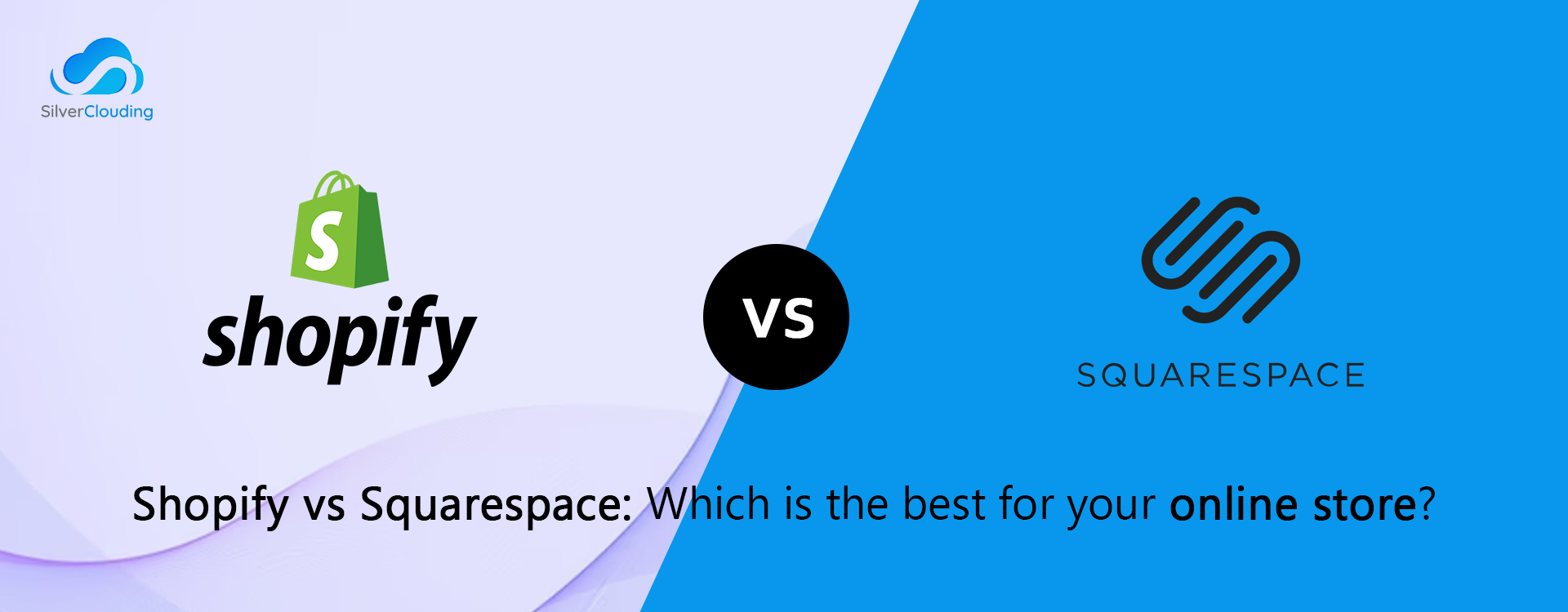The dynamic realm of e-commerce makes it quite difficult to choose the right platform for setting up a successful online store. However, Shopify and Squarespace are two prominent players in this segment, each of which comes with its own set of features and capabilities. But, to decide which is the best, it’s crucial to compare the both in terms of their strengths and weaknesses.
While both Shopify and Squarespace, both have carved a niche in the e-commerce landscape, our exploration leans towards Shopify, positioning it as the superior choice for online stores. As we explore various facets of these platforms, the focus remains on the expertise and role of a Shopify web developer in optimizing your e-commerce success.
Overview of Shopify and Squarespace
Shopify: The E-commerce Powerhouse
Shopify has emerged as a leading e-commerce platform with a robust set of features designed to meet the diverse needs of online businesses. Known for its user-friendly interface, scalability, and extensive app ecosystem, Shopify is a go-to solution for businesses of all sizes.
Squarespace: The All-in-One Website Builder
Squarespace is recognized for its versatility as an all-in-one website builder. While it offers e-commerce capabilities, Squarespace positions itself as a holistic platform for website creation, blogging, and online selling.
User-Friendly Interface
Shopify’s Intuitive Dashboard
Shopify boasts a user-friendly dashboard that simplifies the process of setting up and managing an online store. The intuitive interface allows users to navigate seamlessly, making it an ideal choice for both beginners and experienced entrepreneurs. A Shopify web developer can leverage this interface to customize and enhance the user experience.
Squarespace’s Design-Centric Approach
Squarespace is renowned for its visually appealing templates and design-centric approach. While this may appeal to creative entrepreneurs, the learning curve for managing an online store on Squarespace can be steeper for users seeking a more straightforward e-commerce solution.
E-commerce Features and Customization
Shopify’s Extensive App Ecosystem
Shopify’s App Store is a treasure trove of applications that extend the platform’s functionality. From marketing and analytics to payment gateways and shipping solutions, Shopify’s ecosystem empowers businesses to tailor their online stores to meet specific requirements. These apps can help create a unique and feature-rich e-commerce experience.
Squarespace’s Design-Centric Limitations
While Squarespace offers visually appealing templates, its e-commerce features are somewhat limited compared to Shopify. Customization options may be constrained, hindering businesses with unique needs. Shopify’s flexibility and expansive app ecosystem outshine Squarespace when it comes to tailoring an online store to specific requirements.
Payment Options and Transaction Fees
Shopify’s Seamless Payment Integration
Shopify integrates seamlessly with numerous payment gateways, providing customers with a variety of payment options. The platform’s own payment solution, Shopify Payments, eliminates transaction fees when used, offering cost savings for businesses. This way, it’s easier to optimize the payment process for improved customer satisfaction.
Squarespace’s Transaction Fees and Limited Payment Options
Squarespace, while supporting major payment gateways, charges transaction fees unless users opt for Squarespace Commerce Advanced. This additional cost may be a significant factor for businesses aiming to minimize expenses. The limited payment options compared to Shopify may also restrict the customer base.
Scalability and Performance
Shopify’s Scalability for Growing Businesses
One of Shopify’s standout features is its scalability. Whether you’re a small startup or a large enterprise, Shopify can accommodate your growth seamlessly. The platform’s infrastructure is designed to handle increased traffic and transactions, ensuring a smooth and reliable performance even as your business expands. A Shopify web developer can implement strategies to enhance scalability further.
Squarespace’s Limitations in Scalability
Squarespace, while suitable for smaller businesses, may face limitations as they grow. The platform’s primary focus on design may compromise performance when handling high volumes of traffic or complex e-commerce operations. Businesses with ambitious growth plans may find Shopify’s scalability more aligned with their needs.
SEO and Marketing Capabilities
Shopify’s SEO Optimization Tools
Shopify excels in SEO capabilities, providing tools and features that empower businesses to optimize their online presence. Customizable meta tags, clean URL structures, and mobile responsiveness contribute to higher search engine rankings. A Shopify web developer can implement SEO best practices to enhance a store’s visibility and reach.
Squarespace’s SEO Constraints
While Squarespace offers basic SEO features, it may not match Shopify’s depth in optimization tools. Limited control over URL structures and meta tags could impact a store’s search engine performance. Businesses prioritizing robust SEO strategies may find Shopify more accommodating.
Customer Support and Community
Shopify’s Comprehensive Support
Shopify offers 24/7 customer support through various channels, including live chat, email, and phone. The extensive documentation and active community forums provide users with resources for problem-solving. A Shopify web developer can leverage this support ecosystem to address challenges efficiently.
Squarespace’s Support Limitations
Squarespace provides customer support through email and live chat, but lacks phone support. While the platform’s help center is resourceful, businesses may find the absence of round-the-clock support and a dedicated community forum as limitations.
Pricing and Value for Money
Shopify’s Transparent Pricing Structure
Shopify’s pricing plans are transparent, with clear distinctions and scalable options. While the monthly costs may appear higher than Squarespace at first glance, the absence of transaction fees with Shopify Payments and the extensive features often make it a cost-effective choice. A Shopify web developer can help businesses make informed decisions about the best plan for their needs.
Squarespace’s Competitive Pricing
Squarespace offers competitive pricing, particularly for smaller businesses or individuals seeking a website builder with ecommerce capabilities. However, businesses need to consider transaction fees and the limitations in scalability and features when evaluating the overall value for money.
The Final Takeaway
Choosing the right platform is paramount to the success of your online store. While both Shopify and Squarespace have their merits, our comprehensive analysis positions Shopify as the superior choice for businesses seeking a robust, scalable, and feature-rich e-commerce solution.
For businesses aspiring to optimize their online presence, a skilled Shopify web developer can harness the platform’s flexibility and extensive app ecosystem to create a tailored and high-performance online store. Shopify’s user-friendly interface, scalability, SEO capabilities, and comprehensive support make it the go-to choice for businesses committed to achieving e-commerce excellence.
As the digital landscape continues to evolve, the strategic choice of a platform, coupled with the expertise of a Shopify web developer, can propel your online store to new heights of success. Embrace the power of Shopify and empower your e-commerce journey with a platform designed for growth, innovation, and unparalleled customer experiences.




